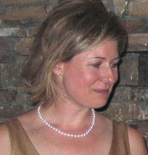Rosalind W. Picard is founder and director of the Affective Computing Research Group at the Massachusetts Institute of Technology (MIT) Media Laboratory, co-director of the Things That Think Consortium, the largest industrial sponsorship organization at the lab, and leader of the new and growing Autism Communication Technology Initiative. She holds a Bachelors in Electrical Engineering with highest honors from the Georgia Institute of Technology, and Masters and Doctorate degrees, both in Electrical Engineering and Computer Science, from the Massachusetts Institute of Technology (MIT). She has been a member of the faculty at the MIT Media Laboratory since 1991, with tenure since 1998. Prior to completing her doctorate at MIT, she was a Member of the Technical Staff at AT&T Bell Laboratories where she designed VLSI chips for digital signal processing and developed new methods of image compression and analysis. She was honored as a Fellow of the IEEE in 2005.
The author of around a hundred and fifty peer-reviewed scientific articles in multidimensional signal modeling, computer vision, pattern recognition, machine learning, and human-computer interaction, Picard is known internationally for envisioning and conducting ground-breaking research in affective computing and, prior to that, for pioneering research in content-based image and video retrieval. She is recipient (with Tom Minka) of a best paper prize for work on machine learning with multiple models (1998) and is recipient (with Barry Kort and Rob Reilly) of a “best theory paper” prize for their work on affect in human learning (2001). Her award-winning book, Affective Computing, (MIT Press, 1997) lays the groundwork for giving machines the skills of emotional intelligence. She and her students have designed and developed a variety of new sensors, algorithms, and systems for sensing, recognizing, and responding respectfully to human affective information, with applications in autism communication, human and machine learning, health behavior change, and human-computer interaction.
Dr. Picard has served on dozens of international and national science and engineering program committees, editorial boards, and review panels, including (most recently) the Advisory Committee for the National Science Foundation’s (NSF’s) division of Computers in Science and Engineering (CISE), the Advisory Board for the Georgia Tech College of Computing, and the Editorial Board of User Modeling and User-Adapted Interaction: The Journal of Personalization Research. She also served as chair of the NSF’s Committee of Visitors for the Information and Intelligent Systems Division.
Picard interacts regularly with industry and has consulted for companies such as Apple, AT&T, BT, HP, i.Robot, and Motorola. She has delivered over sixty-five keynote or major plenary talks at science or technology events, dozens of named talks and presentations at international research labs and universities, and been an honored presenter in ten “Distinguished Lecture” series. Her group’s achievements have been featured in forums for the general public such as The New York Times, The London Independent, Scientific American Frontiers, NPR’s Tech Nation and The Connection, ABC’s Nightline and World News Tonight with Peter Jennings, Time, Vogue, Wired, Voice of America Radio, New Scientist, and BBC’s “The Works” and “The Big Byte.” Picard lives in Newton, Massachusetts with her husband and three energetic sons.




